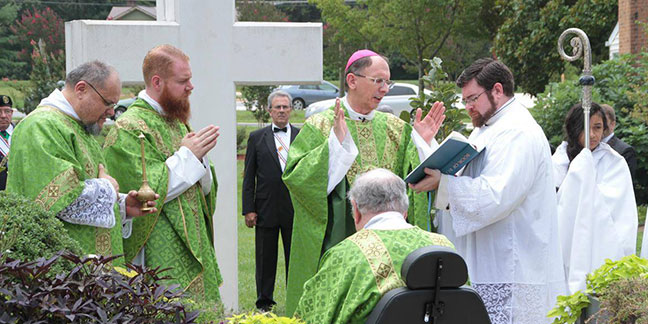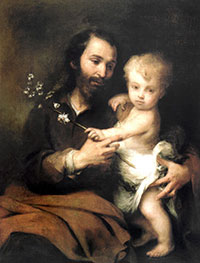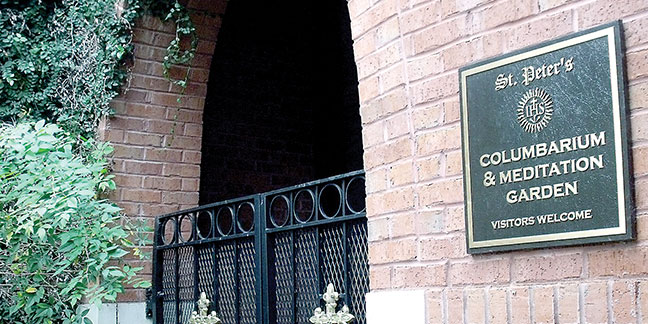Catholic cemeteries are important in the life of the Church. Here's a list of cemeteries and columbaria in the Diocese of Charlotte:
Cemeteries
St. Frances of Rome Mission, Sparta
St. Helen Mission, Spencer Mountain (parishioners only)
St. Francis of Assisi Church, Jefferson
Cemeteries with columbaria
Our Lady of Annunciation, Albemarle
Immaculate Conception Mission, Canton
Holy Family Church, Clemmons (parishioners only)
Holy Cross Church, Kernersville
Sacred Heart Church, Salisbury
St. James the Greater Church, Concord
St. John the Evangelist Church, Waynesville
Columbaria only
St. Eugene Church, Asheville (parishioners only)
St. Elizabeth Church, Boone
Sacred Heart Church, Brevard (full)
St. Joan of Arc Church, Candler (full)
St. Gabriel Church, Charlotte (full)
St. Matthew Church, Charlotte (full)
St. Peter Church, Charlotte
St. Thomas Aquinas Church, Charlotte
St. Vincent de Paul Church,
Charlotte (full)
Immaculate Heart of Mary Mission, Hayesville
St. Aloysius Church, Hickory
Christ the King Church, High Point
Immaculate Heart of Mary Church, High Point (full)
Our Lady of the Mountains Mission, Highlands
St. Paul the Apostle Church, Greensboro
St. Pius X Church, Greensboro
(full, with waiting list)
St. Margaret of Scotland Church, Maggie Valley (full)
St. Luke Church, Mint Hill (full)
St. William Church, Murphy
St. Margaret Mary Church, Swannanoa
St. Leo the Great Church,
Winston-Salem (full)
Public cemeteries with Catholic sections
Stanly Gardens, Albemarle
Sharon Memorial Park, Charlotte
Westlawn Cemetery, Clemmons
Mt. Zion Community Cemetery, Cornelius
Northlake Memorial Gardens, Huntersville
Forest Lawn East Cemetery, Matthews

Cemeteries and Columbaria Policy for the Diocese of Charlotte
'The Church earnestly recommends that the pious custom of burying the deceased be observed; nevertheless, the Church does not prohibit cremation unless it was chosen for reasons contrary to Christian doctrine.' Canon 1176, §3
Church law (Canon 1240) stipulates, “Where possible, the Church is to have its own cemeteries or at least areas in civil cemeteries that are designated for the deceased members of the faithful and properly blessed.”
Because of limited space at many parishes across the diocese, a cemetery on parish grounds is not always practicable. Identifiably Catholic sections in public cemeteries have become an alternative option, as well as columbaria on parish grounds. But columbaria for cremated remains cannot be the only option provided.
Diocesan policy states: “If a parish wishes to make a columbarium available to the faithful, it will also make available at the same location as the columbarium, spaces for burial of the bodies of the deceased. The number of spaces available for placing cremated remains in a columbarium shall not be more than the number of spaces available for burial of bodies of the deceased. The expectation is that more spaces will be available for burial of the bodies of the deceased than spaces in a columbarium for the placing of cremated remains, since burial of the body is the norm of Christian burial.”
Diocesan Policy for Cemeteries and Columbaria
Due to a desire on the part of many of the faithful to have a resting place for their earthly remains that is identifiably Catholic, various parishes in recent years have provided a columbarium on their parish campus. The limitation of space on parish campuses, however, has mostly precluded the possibility of the faithful to choose the option of burial of the body in a resting place that is identifiably Catholic.
In order to respond to the desire of many of the faithful for a resting place that is identifiably Catholic, the Diocese of Charlotte will contract for Catholic sections in local cemeteries, to provide at one location both a resting place for the bodies of the deceased and a resting place for cremated remains.
If a parish wishes to make a columbarium available to the faithful, it will also make available at the same location as the columbarium, spaces for burial of the bodies of the deceased. The number of spaces available for placing cremated remains in a columbarium shall not be more than the number of spaces available for burial of bodies of the deceased. The expectation is that more spaces will be available for burial of the bodies of the deceased than spaces in a columbarium for the placing of cremated remains, since burial of the body is the norm of Christian burial. Thus, in such case that a parish wishes to make a columbarium available to the faithful, the parish will also make available at one and the same location at least an equal number of spaces for burial of the bodies of the deceased, and preferably a greater number of spaces for burial of bodies. There is no requirement that a columbarium be constructed, since cremated remains may be buried in the ground at the cemetery. At the center of the cemetery will stand the cemetery crucifix.
The Diocese of Charlotte may also receive land or purchase land for the establishment of a Catholic cemetery.
With this policy the Diocese wishes to respond in a comprehensive way to the vision of canon 1240 to provide a resting place for the remains of the faithful departed.
Adopted March 13, 2007
Revised August 15, 2010
Diocese of Charlotte
Why is it important to have a grave?
Our cemeteries are places of great sign value as were the catacombs of old.
The grave and the marker are visible signs that a person did live and that it mattered that he or she lived. Years from now someone will walk by our graves and remember us and that it was important that we lived and died. Cemeteries are places of catechesis about death and they are places of prayer in the context of the communion of saints and our waiting for the final coming of the Lord.
We visit the grave often to pray for the deceased and we decorate the graves regularly, especially on Nov. 2, All Souls Day.
— "Catholic Funeral Guide," St. Michael the Archangel Church in Gastonia
 ‘Now and at the hour of our death’
‘Now and at the hour of our death’
We prepare for eternal life by choosing to love and follow God now, in our daily lives and decisions.
For example, through prayer and regular reception of the sacraments, especially confession and the Eucharist, we obtain grace to live in ever-deeper communion with God and with one another in lives of faith, charity and justice. We ask for Our Blessed Mother’s help now, and we entrust ourselves to her further as we “surrender ‘the hour of our death’ wholly to her care.” (Catechism of the Catholic Church, 2677)
— USCCB
The right to a funeral liturgy
Church law stipulates that funeral services are a right, not a privilege, of all members of the Church, both the faithful and the catechumens (Canons 1176; 1183, §1). The Order of Christian Funerals also provides for the celebration of funeral rites for children whose parents intended them to be baptized (Canon 1183, §2).
“Christians celebrate the funeral rites to offer worship, praise, and thanksgiving to God for the gift of a life which has now been returned to God, the author of life and the hope of the just. The Mass, the memorial of Christ’s death and resurrection, is the principal celebration of the Christian funeral.” ("Order of Christian Funerals," no. 5)
“At the funeral liturgy the community gathers with the family and friends of the deceased …
– to give praise and thanks to God for Christ’s victory over sin and death,
– to commend the deceased to God’s tender mercy and compassion,
– and to seek strength in the proclamation of the paschal mystery.
Through the Holy Spirit the community is joined together in faith as one Body in Christ to reaffirm in sign and symbol, word and gesture that each believer through baptism shares in Christ’s death and resurrection and can look to the day when all the elect will be raised up and united in the kingdom of light and peace.” ("Order of Christian Funerals," no. 129)
Non-practicing Catholics may receive Catholic funerals
It is an unfortunate reality that many baptized Catholics no longer practice their faith and may consider themselves to have been away from the Church for too long to be ever welcomed again by the Church.
Such individuals or their families may feel uncomfortable in a church and ultimately decide against having a Catholic funeral.
By our baptism, however, we have been made equal in dignity before the Lord, and the Church, our Mother, bears the suffering of all those who became her sons and daughters through baptism. Thus, the Church offers funeral rites (including a funeral Mass) even for non-practicing Catholics and, under certain circumstances, for non-Catholic Christians.
Although the deceased may not have participated fully in the life of the Church on earth, the Church longs for her separated children to share in Christ’s blessings. She desires to pray for them and with their loved ones so that their sins may be forgiven and they may dwell forever in the presence of God in heaven.
— “Catholic Funeral Planning Guide,” Diocese of Portland, Maine; Code of Canon Law 1183, §3
What about miscarried or stillborn babies?
Depending on the possibility of your collecting the remains, the baby should be named, baptized (if death is uncertain or if the baby has just died) and buried. If you are in a hospital, the remains of the baby will be sent to the pathologist. You should request that you receive the remains.
Most hospitals have little caskets which they offer you. If the baby is more developed a larger casket may need to be obtained from a funeral director. You should have a Mass of Christian Burial and bury the baby appropriately and in a marked grave.
— “Catholic Funeral Guide,” St. Michael the Archangel Church in Gastonia
Why is it important to have a grave?
Our cemeteries are places of great sign value as were the catacombs of old.
The grave and the marker are visible signs that a person did live and that it mattered that he or she lived. Years from now someone will walk by our graves and remember us and that it was important that we lived and died. Cemeteries are places of catechesis about death and they are places of prayer in the context of the communion of saints and our waiting for the final coming of the Lord.
We visit the grave often to pray for the deceased and we decorate the graves regularly, especially on Nov. 2, All Souls Day.
— "Catholic Funeral Guide," St. Michael the Archangel Church in Gastonia
Joseph, Patron of Dying and Solace of the Afflicted
 What a blessed death to see God before you die and for God Himself to tell you to go. This was Joseph’s gift from his Son, who would hand His father over to His Father. Thus has Christ entrusted Joseph to have particular intercessory power for all those on the moment of death.
What a blessed death to see God before you die and for God Himself to tell you to go. This was Joseph’s gift from his Son, who would hand His father over to His Father. Thus has Christ entrusted Joseph to have particular intercessory power for all those on the moment of death.


 ‘Now and at the hour of our death’
‘Now and at the hour of our death’